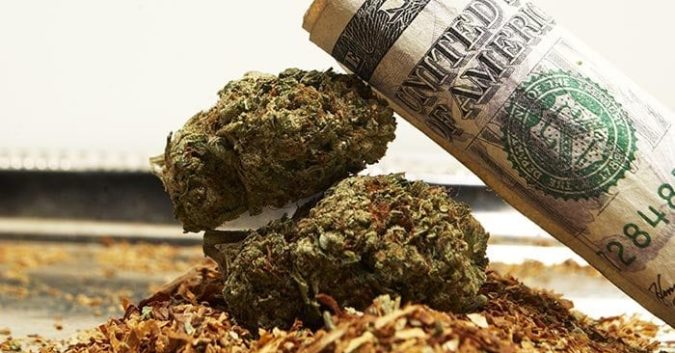A mother is horrified when she pulls into a toy store and sees a marijuana dispensary next door. Her daughter is in the car. The young girl runs over to look at some tasty-looking candies in the dispensary’s window, and the mother becomes even more distraught. Suddenly, a teenager walks out the store, his arms overflowing with marijuana supplies. “Mom?” he asks.
The mother is anguished. “Kevin?” she responds.
Residents of Massachusetts are likely very familiar with this TV commercial. It’s been airing in the state during the run-up to November 8th’s Massachusetts Marijuana Legalization Initiative vote, also known as Question 4. MA residents will vote whether or not to legalize the recreational use of marijuana.
At the end of the TV commercial, a stern voiceover urges the viewer: “Vote NO on 4.”
The Truth behind the Ad
What many Massachusetts residents probably don’t know is that this “No on 4” advertisement was funded in part by the alcohol industry. That’s right, the organization behind the “No” campaign, the Campaign for a Safe and Healthy Massachusetts, has received over $75,000 from the Wine & Spirit Wholesalers of Massachusetts, Inc., Beer Distributors of Massachusetts, Inc., and numerous local bars, according to the Massachusetts Office of Campaign & Political Finance.
This is all fairly ironic, considering one of the main points made in the commercial is that legalized marijuana will cause people to drive dangerously under the influence. This “safety-first” message is coming from an industry responsible for thousands of fatal car accidents each and every year. In fact, approximately one-third of all traffic-related deaths are caused by drunk driving.
Is the alcohol industry really concerned about traffic accidents? Of course not. The alcohol industry is concerned first and foremost with profits and competition: legalizing marijuana would increase competition and therefore reduce profits. For this reason, it’s quite clear: Big Alcohol wants you to “Vote NO on 4.”
A Big Question for Massachusetts
While both drunk and drugged driving are of course problematic in their own ways, legalizing marijuana could potentially have some benefits. One of the big ones is tax revenue. In Colorado, marijuana sales are expected to exceed $1 Billion in 2016.
Because the industry is highly regulated and taxed, all of the new revenue is allowing both state and city governments to undertake projects that would never have before been possible.
For example, the city of Aurora is spending $1.5 Million to address homelessness, improve roads, and build a new recreation center, while Adams Country has put $500,000 into scholarships for low-income students.
This is all money that would otherwise have gone to drug dealers and ultimately drug cartels.
Some Other Reasons for Potential Legalization
There is also growing research suggesting cannabis may serve as a powerful analgesic (pain reliever) and anti-inflammatory agent. This means the legalization of marijuana would not only reduce suffering for men and women beset with physical and mental illnesses and injuries, but that people in need would have an alternative option to the often-dangerous opioid painkillers such as OxyContin®, Percocet®, and Vicodin®.
Opioid addiction is a tremendous problem in America. According to the National Institute on Drug Abuse (NIDA), over 2 million Americans are addicted to prescription painkillers while another half-million are addicted to heroin. Heroin is a form of opioid, and many people addicted to expensive pharmaceutical opioids turn to heroin, including America’s ailing and wounded veterans. In 2014, 19,000 Americans tragically died from painkiller overdose while 10,000 died from heroin overdose. Both figures were record highs and are only expected to continue increasing.
Finally, legalizing marijuana would also significantly alleviate strain on the state judiciary and correctional facilities for non-violent drug offenses. Although marijuana arrests in Massachusetts dropped significantly after possession of small amounts of the drug was decriminalized in 2008, there are still thousands of inmates in overcrowded Massachusetts prisons on charges related to marijuana.
What’s worse, a recent study found that racial discrimination is a significant factor in who gets busted for marijuana. African-American residents of Massachusetts were found to be 3.3 times more likely to be arrested for possession, despite equal proportions of white and black people using the drug.
Black residents were 7.1 times more likely to be arrested for selling the drug. According to Rashaan Hall, American Civil Liberties Union (ACLU) official, “Taxing and regulating marijuana is an important step towards reducing the harm that current policies cause to people of color, particularly Black people.”
Time to Vote
Next week, on November 8th, Massachusetts residents will not only cast their votes for president, they will also give their answers to Question 4. The result will either see a continuation of the status quo or the legalization of pot.
As there are benefits and disadvantages to each outcome, voters should think hard before they cast their vote. And when they see the horrified face of Kevin’s mother on TV, perhaps they should remember the big money interests paying for that commercial.
